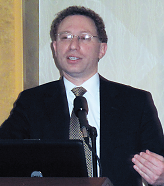Beware of Ethics Traps in Social Networking World
Abstract
The proliferation of online social networking applications poses new challenges to ensuring the ethical treatment and privacy of psychiatric patients, emphasized David Brendel, M.D., Ph.D., associate medical director of inpatient psychiatry at Walden Behavioral Care in Waltham, Mass., and assistant professor of psychiatry at Harvard Medical School.

David Brendel, M.D., Ph.D., notes that privacy is very easily breached for both patients and psychiatrists on social networking sites unless care is taken.
Speaking last November 17 at an APA-sponsored ethics workshop in Washington, D.C., for district branch ethics chairs and executive directors, Brendel recommended that the best approach to practicing psychiatry in “the age of Googling, friending, and tweeting” is to stay up to date on technological developments while exercising caution in sharing and searching for patients’ personal information.
While the ubiquity of e-mail communication and online research has made the Internet a “routinely applied clinical tool” in recent years, few guidelines currently exist on how psychiatrists can use such applications as Facebook and Twitter in an ethical and professional manner, Brendel said.
And in an environment in which Web sites enable patients to rate and review physician interactions with no check on their accuracy, Brendel urged psychiatrists at the workshop to “be aware of your online presence.”
He cited a 2008 University of Florida study that found that while nearly 50 percent of medical trainees said they had a Facebook account, 62.5 percent of these students and residents failed to activate the privacy settings on their online social networking profiles.
Brendel also addressed ethics concerns associated with physicians searching for public information about their patients. While reporting the online discovery of a patient’s suicidal thoughts or criminal behavior may strike some physicians as an ethical imperative, they should consider the appropriateness of and their motives for seeking out such information in the first place, he said.
And when it comes to interacting with patients online, Brendel believes that the risks may ultimately outweigh the benefits.
“Under no circumstance should a physician invite a patient to become an online friend,” he maintained.
If invited to join a patient’s online social network, Brendel recommend that a psychiatrist consider discussing the issue with the patient in person. He added that any private information obtained about a patient online should not be entered into the patient’s medical record without the patient’s prior consent.
Brendel also pointed out the lack of mentorship that exists in the area of establishing online boundaries, as a large segment of older psychiatrists remain unfamiliar with these technologies and thus in many cases cannot provide guidance to their younger colleagues. He urged those new to the online world to ask questions and do some exploring.
“This is more a question about how these tools will be used then about whether they will be used,” he said.



